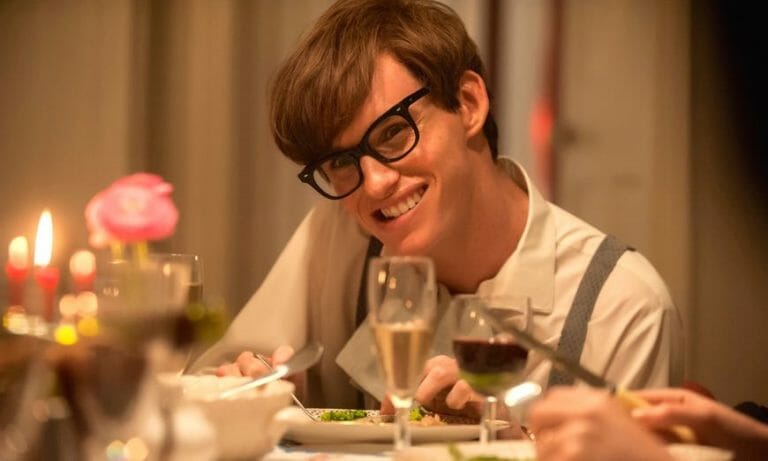By Ron Chatterjee · February 10, 2015

The tagline already tells the incredible life story of a man who went on to answer the ultimate question that connects ‘everything,’ including life itself, and how one woman stood by him through thick and thin, and without whom he might not have been where he is now.
The Theory of Everything, a 123-minute long biographical romantic drama, is based on the life of one of the greatest living minds of our time, Stephen Hawking and his wife, Jane Wilde Hawking.
The film is supposedly based on direct interviews and the book “Traveling to Infinity: My Life With Stephen” penned by Jane Wilde Hawking herself. And though I haven’t read the book, the film is more than an adequate rendition to the life of Hawking, right from the day he met Jane Wilde, a literature undergraduate at Cambridge University, at a New Year’s party to the day he left her for his nurse Elaine Mason.
The journey in between, the endless struggle, the unwavering inner strength of Jane Wilde and the beaming eyes of Hawking – all are exceptionally portrayed in this masterpiece by James Marsh, the director of the famous Man On Wire.
James Marsh, a master at documentaries no doubt, has shown once again that one does not need to contort facts to make a film interesting. It just has to be told well. With the clever set of montages, the smart use of sepia photography and the inimitable score of Jóhann Jóhannsson, he recreates the magic of the nostalgic atmosphere of the 1960’s. The old classrooms, the chalk and board, the laboratory, the game of croquet, the quest for the “answer” to the ultimate question of life, the growing friendship between Hawking and Prof. Sciama…everything led you to a different world and let you live it.
The film starts as we see five people inside the Buckingham Palace. One of them in a wheelchair and another standing beside him, while three children frolick around. We see Jane Wilde open the glasses of Hawking, wipe them clean and replace them on his nose, saying, “Your glasses are always dirty.” The very first thing she did when she hugged Hawking teetering on his unstable limbs in his college room, after knowing he was detected with Amyotrophic Lateral Sclerosis (ALS), more commonly known as Lou Gehrig’s disease.
It’s said that a nurse wiped a tear of Hawking’s cheek after he saw the film screening at the Toronto Film Festival in early September. He later said that during the film, he felt that it was him. And that goes to the credit of Eddie Redmayne, who played Colin Clark in My Week With Marilyn. The way he transformed into the real Hawking and portrayed it onscreen was absolutely deserving of plaudits (nevertheless, he got the Golden Globe Award for Best Actor – Motion Picture Drama, the Screen Actors Guild Award for Outstanding Performance by a Male Actor in a Leading Role (SAG) and the BAFTA Award for Best Actor in a Leading Role, along with several other nominations). With the thick black framed spectacles, the wide grin and the original humorous smirk, he looked more like Hawking than Redmayne.
Alongside Redmayne, how can we forget Felicity Jones, who played Jane Wilde Hawking in the film? We last saw Felicity Jones as Felicity Hardy in Amazing Spider-Man 2, and one thing that amazes me about Jones is the truth that emanates from her eyes. That truth, the grit, the determination made her the best candidate to play Jane Wilde Hawking and she proved us right. With flawless acting, silent yet impactful expressions, control and a strong English accent, we could see see the real Jane Wilde as she was. In fact, the real Jane Wilde is quoted as saying that she was surprised to see how Felicity had imbibed her mannerisms in the few meetings between them.
Last but not least, it was Anthony McCarten who made all this possible. It was he who first read “Traveling To Infinity: My Life With Stephen” and thought of writing a story on it. Without any guarantee in place, he prepared multiple drafts with numerous meetings with Jane Wilde Hawking at her home. And the result was outstanding, as we can now see. The amazing dialogues and the well-placed scene sequences will keep you captivated on to what happens next, and what impressed me the most was how a complex subject as singularity was scribbled in a layman’s language so everybody can understand and cherish it. The wit and humor of the real Hawking was kept intact through the snappy dialogues. For example, on being asked what cosmology is, Stephen replies, “It’s a religion for the intelligent atheists.” Or perhaps, the most emotional scene when Stephen lets Jane know that he is leaving her, and Jane turns back and says, “I have loved you; I did my best.”
Overall, considering the super-strong acting by Redmayne and Jones, well-directed cinematography by Marsh and a captivating plot line by McCarten that tells a story where a man overcomes the game of life, through his quest of time, I think the movie was outstanding in its own right. This is the impactful drama that measures up to its large scale subject matter.